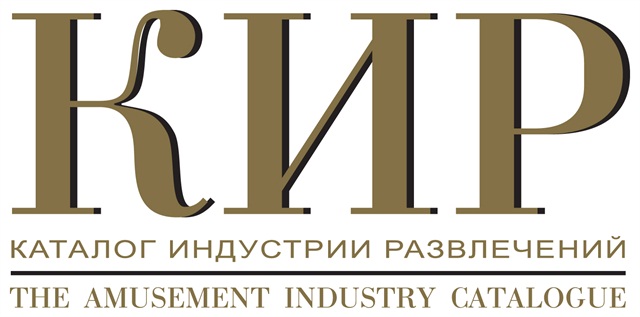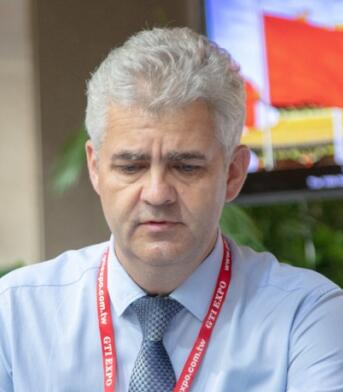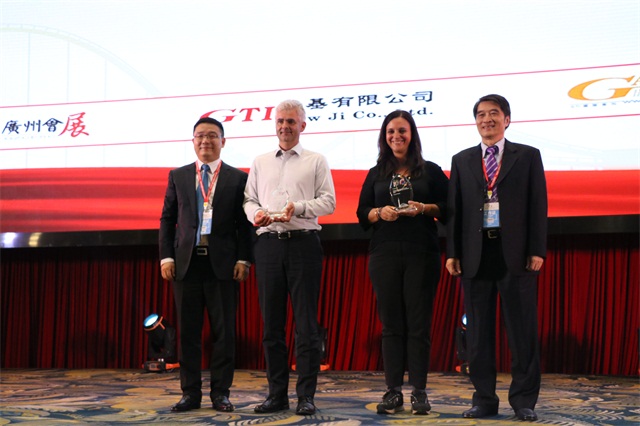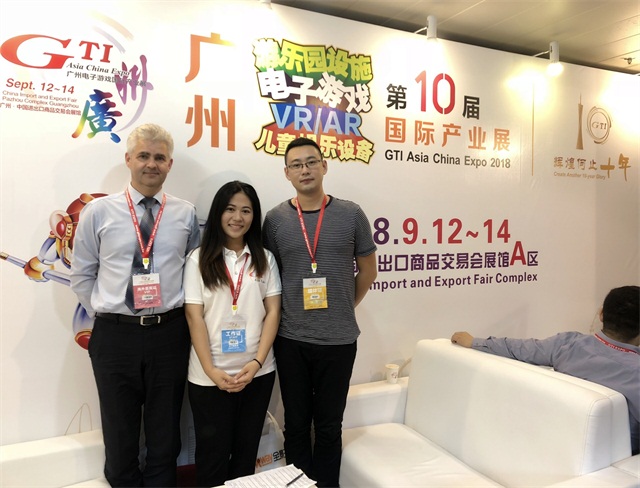Interview with Mr. Kirill Palman, the President of AIC Magazine
Michelle Mak
 
Russia, a country full of legends, is located to the north of China. With its considerable policies, economics and geographical position, Russia has a role that cannot be underestimated among the countries along the "Belt and Road". So, how is the development of the game and entertainment industry in Russia at present? What kind of game entertainment equipment are required to meet the needs of the Russian market? What preparations do Chinese manufacturers need to make to enter the Russian market? Fortunately, GTI was honored to invite Mr. Kirill Palman, President of the Russia-based magazine the Amusement Industry Catalogue (AIC) to visit the 10th GTI Asia China Expo. Through his sharing, we could observe the image and development of Chinese products in overseas and the current situation of the Russian market.
The advantage of China-made products in the Russian market

GTI’s organizing committee Mr. Ou Yangyun (L1) & Mr. Thomas Liu (R1) presented the 10th anniversary trophy to Mr. Kirill Palman (L2).
Game Time Int’l (GTI): What is the development status of the local game and entertainment industry in Russia at present? Are there any popular machines that can drive the economy of the industry? Can you predict the development trend of Russian game market over the next five years?
Kirill Palman (KP): At present, the cooperation between the Russian game entertainment market and companies in Italy, Germany, France, the United States and other countries is decreasing. We are gradually turning our attention to the Chinese market. Coupled with the fact that China-made equipment has been laying a foundation in the Russian market for a long time, Chinese game equipment now has a comparative advantage in entering the Russian market. Over the next five years, if Chinese manufacturers want to be competitive in the Russian market, first of all, their price should be reasonable. Because the Russian economy has not been very stable during the last two years, the disposable income of the people has decreased, the purchasing power has decreased correspondingly, and the products with reasonable prices have a market in Russia. Secondly, the product should be novel. The models of local game and entertainment equipment in Russia are quite old, including those produced three or four years ago and even five years ago. If you want to get a foothold in the Russian market, new equipment is indispensable.
GTI: Do Chinese machines occupy a large share of the Russian market? After attending the GTI show, which kind of products do you think are more suitable for entering the Russian market? Why?
KP: I haven't done any statistics before, so I can only estimate about 20% based on my personal experience and this is not an accurate figure. In my opinion, products that conform to the thinking habits of Russians are more suitable for entering the Russian market. In China, it doesn't matter that consumers don't get gifts when playing the crane machine, but Russians think it is unreasonable. Their concept and way of thinking is that they need to be rewarded when spending money on a crane machine, even if it is a small reward. And gift machines would be popular in Russia if players were guaranteed to get a present after every coin they put in. Another example is the coin pusher, which is not applicable in Russia, where people think it is a waste of money. Besides, game and entertainment equipment have a wide appeal, ranging from children to the elderly, which cannot be summarized in a word. But there is a kind of children's puzzle swimming pool that is very popular in Russia. They are placed in the gym and are available to children aged 4 to 5 years old when the adults work out, with special personnel to watch over the kids and train their independence. I think educational devices are a development trend of future games and entertainment.
GTI: Can you tell us about the regulations related to the game entertainment industry in Russia?
KP: In Russia, we are most concerned about safety first, especially for children’s amusement equipment. The first that we pay attention to most is the qualified certificate of the product, and then is the safety of equipment operation to avoid accident and injury as far as possible. I don't know why there are fewer games and entertainment facilities in Russia. It may be because of the relatively small population. Some people have been diverted to cinemas and entertainment venues, while fewer go to the amusement centers, but I think there will be more in the future. The environment in Russia also has a certain impact. Winter is very cold, and half of the time of a year is spent indoors, which greatly reduces the variety of some game and entertainment equipment. And the operating charges if indoor venues are always much more expensive than outdoor ones’, because they need heating installation. So the game and entertainment equipment is less. In some Russian cities, game and entertainment facilities need to be set up in special places, such as St. Petersburg. Unlike in China, most amusement devices can be set up anywhere such as at shops, supermarkets, and other places. In St. Petersburg, game and entertainment equipment must be set up in special amusement centers. Of course, other cities may allow it. There are some companies specializing in VR in Russia, but there are only a few types of VR games, and the majority of VR games are enclosed space + head display. However, the VR games with interactive seats presented on the scene of GTI Asia China Expo should be very popular in Russia.

Suggestions for Chinese manufacturers to enter the Russian market
GTI: If Chinese exhibitors intend to expand in the Russian market or enter the European market through Russia, what are your suggestions?
KP: I think there are two ways for Chinese exhibitors to expand in the Russian market: 1. The Russian market proposes some desired products to the Chinese suppliers, and then the Chinese suppliers produce the products according to the needs of the Russian market; 2. Chinese suppliers can test whether their products are suitable for the Russian market by attending exhibitions in Russia or advertising in Russian magazines.
GTI: Which part of the exhibition impressed you the most? And what products, technologies, or exhibitors interest you the most? Could you make a comment or give some suggestions on our exhibition?
KP: Everyone has his/her favorite products, and I used to be a soldier, so I am more interested in shooting products. GTI Asia China Expo is very large. I hope to see more Russian visitors at the show or more and more Chinese manufacturers march into the Russian market. It is a significant step to promote the friendship between China and Russia.
GTI: The next GTI Asia China Expo will be held on September 10~12, could you kindly send us some wishes?
KP: I hope that GTI Asia China Expo will keep on improving in popularity all over the global.
※The article is published in the Jan.&Feb. combine issue No. 172 of GTI Magazine in 2019 |